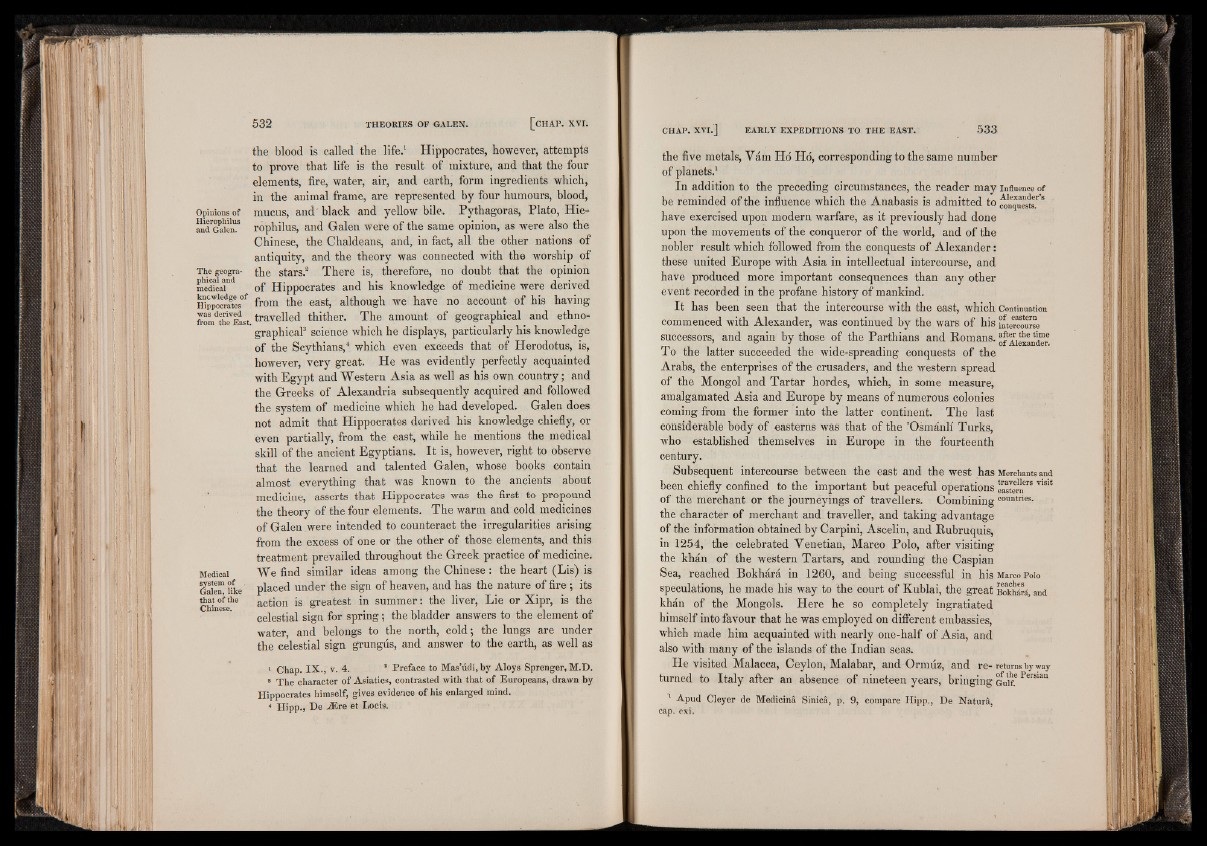
the blood is called the life.1 Hippocrates, however, attempts
to prove that life is the result of mixture, and that the four
elements, fire, water, air, and earth, form ingredients which,
in the animal frame, are represented by four humours, blood,
Opinions of mucus, and' black and yellow bile. Pythagoras, Plato, Hie-
anTGakiT rophilus, and Galen were of the same opinion, as were also the
Chinese, the Chaldeans, and, in fact, all the other nations of
antiquity, and the theory was connected with the worship of
Thegeogra- the stars.2 There is, therefore, no doubt that the opinion
med?caind of Hippocrates and his knowledge of medicine were derived
Hippocrates°f from the east, although we have no account of his having
from**tiie fist travelled thither. The amount of geographical and ethnographical3
science which he displays, particularly his knowledge
of the Scythians,4 which even exceeds that of Herodotus, is,
however, very great. He was evidently perfectly acquainted
with Egypt and Western Asia as well as his own country; and
the Greeks of Alexandria subsequently acquired and followed
the system of medicine which he had developed. Galen does
not admit that Hippocrates derived his knowledge chiefly, or
even partially, from the east, while he mentions the medical
skill of the ancient Egyptians. It is, however, right to observe
that the learned and talented Galen, whose books contain
almost everything that was known to the ancients about
medicine, asserts that Hippocrates was the first to propound
the theory of the four elements. The warm and cold medicines
of Galen were intended to counteract the irregularities arising
from the excess of one or the other of those elements, and this
treatment prevailed throughout the Greek practice of medicine.
Medical We find similar ideas among the Chinese : the heart (Lis) is
GMe“ Eke placed under the sign of heaven, and has the nature of fire ; its
ftcurf the action is greatest in summer: the liver, Lie or Xipr, is the
celestial sign for spring; the bladder answers to the element of
water, and belongs to the north, cold; the lungs are under
the celestial sign grungus, and answer to the earth, as well as
1 Chap. IX ., v. 4. ! Preface to Mas’iidi, by Aloys Sprenger, M.D.
• The character of Asiatics, contrasted with that of Europeans, drawn by
Hippocrates himself, gives evidence of his enlarged mind.
4 Hipp., De Aire et Locis.
the five metals, Yam Ho Ho, corresponding to the same number
of planets.1
In addition to the preceding circumstances, the reader may influence of
be reminded of the influence which the Anabasis is admitted to
have exercised upon modern warfare, as it previously had done
upon the movements of the conqueror of the world, and of the
nobler result which followed from the conquests of Alexander:
these united Europe with Asia in intellectual intercourse, and
have produced more important consequences than any other
event recorded in the profane history of mankind.
It has been seen that the intercourse with the east, which Continuation
commenced with Alexander, was continued by the wars of his intercourse
successors, and again by those of the Parthians and Romans. ^XiexancTr
To the latter succeeded the wide-spreading conquests of the
Arabs, the enterprises of the crusaders, and the western spread
of the Mongol and Tartar hordes, which, in some measure,
amalgamated Asia and Europe by means of numerous colonies
coming from the former into the latter continent. The last
considerable body of easterns was that of the ’Osmanli Turks,
who established themselves in Europe in the fourteenth
century.
Subsequent intercourse between the east and the west has Merchants and
been chiefly confined to the important but peaceful operations S*rn ’" TIS1*
of the merchant or the joumeyings of travellers. Combiningcountries-
the character of merchant and traveller, and taking advantage
of the information obtained by Carpini, Ascelin, and Rubruquis,
in 1254, the celebrated Venetian, Marco Polo, after visiting
the khan of the western Tartars, and rounding the Caspian
Sea, reached Bokhara in 1260, and being successful in his Marco Polo
speculations, he made his way to the court of Kublai, the great Bokhira, and
khan of the Mongols. Here he so completely ingratiated
himself into favour that he was employed on different embassies,
which made him acquainted with nearly one-half of Asia, and
also with many of the islands of the Indian seas.
He visited Malacca, Ceylon, Malabar, and Ormuz, and re- returns by way
turned to Italy after an absence of nineteen years, bringing GuiffPersiaa
1 Apud Cleyer de Medicina Sinic&, p. 9, compare Hipp., De Natur&,
cap. cxi.